Steve Hackett - Interview
by Paul Waller
published: 3 / 10 / 2013
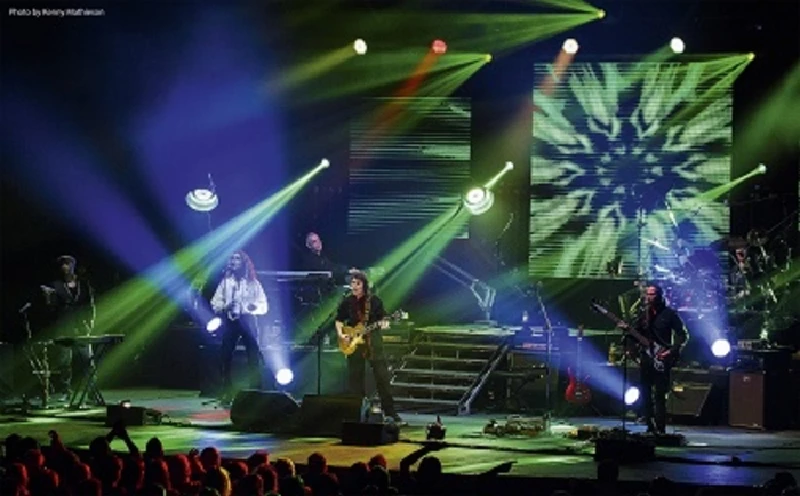
intro
Paul Waller talks to former Genesis guitarist Steve Hackett about his forthcoming tour and new album 'Genesis II', which reworks several of the songs from his eight years in the band with guest vocalists
Steve Hackett is one of the great British guitarists. Whilst he only spent an eight year period in progressive rock behemoths Genesis, his unique stamp was left on everything the band released between 1971 to 1977. Mastering his immaculate playing in the recording studio may have been one thing but to do it live night after night was something else entirely, yet this is where his reputation grew. To this day many Genesis fans cite his departure from the group to be the turning point from the creative left field progressive rock style they loved to the more commercial efforts of what was to follow. Yet on his own, as well as embellishing his love for classical playing during the 80s, Steve embraced pop music himself with mixed results. He appears to be a man unable to rest and take things easy. His incredibly varied back catalogue is testament to that. Hackett has continued to release solo recordings, and has collaborated with outside artists intensely over the years. Yet as of last year he appears to have come full circle with his latest album entitled ‘Genesis Revisited II’, a sequel-of-sorts to his 1996 album 'Genesis Revisited'. This is being followed by a 3 CD/2 DVD live album 'Genesis Revisited: Live at Hammersmith' which will come out on late October. As he prepares for another UK leg of the accompanying 'Genesis Revisited' tour, Pennyblackmusic on the phone to Steve found him in a justifiably jubilant mood. PB: There has been an overwhelming positive reaction for the ‘Genesis II’ album, both from the fans and unusually the critics as well. SH: I like the idea of turning around critics. That’s always good to get those people that thought they were not going to like it and then did. It’s the best thing imaginable and it went down well. A lot of people did help me on it; there were a lot of extraordinary performances by people, from orchestral players to singers and drummers. Around forty people helped out in the end, an orchestra’s worth. I was just thrilled that so many people just did it and they did it for the hell of it. PB: I loved Nik Kershaw’s vocal take on ‘The Lamia’. How did that recording session go and how did you collate the vocalists’ performances? SH: Very well, in fact. Like many of the singers they preferred to work at home because this material is known. It was a huge phone in, all of this. We just worked with files. Regarding other peoples’ performances, it was an album that was constructed via file sharing. We did meet up, but that would usually be in a restaurant once it was all done which was great. I had met the people beforehand but, yeah, it’s extraordinary that hardly anybody met face to face during the recording and there were no amplifiers used either which was the other strange thing about the album, so in a way it’s a very high tech take on some very old music. PB: How did you choose who would contribute to the album? Did they contact you? Francis Dunnery from It Bites, for instance? SH: Well, that worked out because I’d worked with Simon Collins who is Phil Collins’ son and I’d helped him a few years ago when he wanted to do some stuff. I was in the middle of a tour and I was so gutted that I couldn’t do it, but eventually the time came around that I could. He mentioned that he was working with Francis Dunnery and how did I fancy working with him? Now I remembered that Francis was not only a fab guitarist, but that he is also an extraordinary singer. PB: Well, yeah, what a vocal take he did for ‘Dancing with the Moonlit Knight’? SH: Yeah, it was a great vocal take. From the very word go he just seemed to have that sound that reminded me so much of the way that Peter Gabriel used to sing that song. He just used to have that tone when it’s completely unaccompanied. Ah, the influence of Scottish plainsong on Genesis. [Sings – Bodu dom dom dom, Bodu dom dom dom] There is a bit of Andy Stewart in there. That song was influenced by so many different things, and is arguably my favourite Genesis track, and I love the version that we did. Yeah, I love them both, the early Genesis version with all the warts in and the new one with all its polish. PB: I agree, his vocal is so clean and so precise. SH: And it’s not an easy song to sing either. You know with a lot of these early Genesis songs a lot of time you find that they are written in some very unfriendly keys for all concerned. For various reasons something might be written in a certain key because it happened to fit an F sharp tuning on the guitar that might happen to facilitate the black notes on the keyboard. It’s as weird as that and some of those choices were made for just crazy reasons, but that did mean that you were always operating without a sat nav form the word go. That was good; it’s always good to be off the map. PB: Having produced such a precise and polished album in ‘Genesis Revisited II’, have you had that feeling that most artists get of “I wish I had done that differently” now you have lived with it for a few months? SH: Well not on this particular album. I would have to think long and hard about that because I was very pleased with the way that it has come out. I am currently working up some tunes that we haven’t played yet. We have already done a British and European tour, so we are doing some songs now that are even older such as ‘The Fountain of Salmacis’ off of ‘Nursery Cryme’. That will join the other track off ‘Nursery Cryme’, ‘The Return of the Giant Hogweed’. So, I am relearning those and will be running through them with the band for the first time very soon. It is a funny thing. I had to spend three months in rehearsal to get this stuff to be ready to play live. and I broke out in a panic rash trying to do it. I’d never had eczema before. I felt that I could get my fingers around it, but it is so strange to play. It’s all over the fret board, this stuff. None of it is really formulaic. You couldn’t say it is formula blues as much as I love blues. I am not disparaging that as that is what I grew up playing and learning the electric guitar doing, but this is mainly from the European tradition. There is American influence in there, of course. There is that big band influence from Phil Collins, so that’s where we get the accents and syncopation from on that early stuff. PB: You also take great influence from the classical greats; it’s ingrained into your technique now, but what gives you the most pleasure to play? SH: Well… It all does really; it’s a bit like honouring different gods. Whenever I think to myself that I will just be an electric guitarist and that is what I will do with the rest of my life, I begin to have dreams about, say, the nylon guitar and what it can do, and I am finding that it can do more and more. Wouldn’t it be wonderful if there was an instrument that existed that would allow me to morph from one to the other immediately without me having to put one down and pick the other up? I wish I could play the electric guitar in the way that I can play the nylon but you can’t because it has a blur and a distort, but maybe a new instrument will be developed one day and be really clever and able to do it all. Somehow I don’t think it will be in my lifetime, not on this planet anyway. PB: If a person was to delve into your past once more to a time after you left the Genesis fold, you would find a rich catalogue of albums with multiple styles at play. ‘Defector’ and ‘Cured’, for instance, I really like, but they contain some odd production choices, especially the drums on ‘Cured’. SH: Yes, it was. At that time we did that with a Linn drum and that is one decision I regret, but it is a document in time, I had some great bands before that, not just Genesis but the band that kicked off my afterlife with the ‘Spectral Mornings’ album. It was wonderful also to work with people like Richie Havens who passed on recently and other greats like Randy Crawford, but by the time I had my own band we had both ‘Spectral Mornings’ and ‘Defector’ which are really two sides of the same coin, so I tend to think of them as one album really. They were a wonderful band and I still work with some of them; Nick Magnus, for example, who has done some wonderful stuff himself on the keyboards, and I am really proud to have played with him on that. With ‘Cured’, he and I really put that one together. But one thing that really stays with me is that drum sound and the fact that there is a limitation when you decide that you are going to have all your drums programmed, but it was an interesting experiment and I was singing properly for the first time and I didn’t have to worry about the band. I was getting to grips with that too. PB: It’s an odd one; on top of that drum sound there is a fantastic overlooked record full of brilliant singing and fully developed pop melodies. SH: It is probably the closest thing to a pop album that I have done. I’m glad you liked it. Maybe it’s because you received it with young ears that you are much more forgiving. When I used to listen to Radio Luxembourg when I was twelve years old I used to think that every other song was an act of pure genius. It’s a wonderful thing, knowing less. It’s a bit like going to the theatre. Now I know nothing about going to the theatre, but I find it really lovely to see actors performing live and I don’t think to myself that this person missed a cue or that went wrong or that it should be Tom Stoppard or Shakespeare. I won’t be thinking that. What I am thinking is how wonderful that this medium exists. I think to be forgiving in this way is a blessing, to take on things at the point where you are still a kid. When I was a kid I grew up listening to everything. There was no distinction. There was no segregation of music at that time. You’d get everything. You’d get a piece of Gluck sang by Kathleen Ferrier next to Elvis and Glenn Miller, and this would all be on the same radio programme and nobody was any the wiser. It was all just music. Now we don’t want to go back to those days of Auntie Beeb having control in that way, but what was kind of nice about that era was that if you wanted to buy a record you would literally go to a shop that might sell washing machines, and what you might find is brown cardboard boxes with a few albums in them and they were not in any particular kind of order. You really were your own archaeologist. You were discovering all the time and you would have to also be your own historian. You had to keep your eye on the ball because the music business was a very small time affair indeed. PB: Wow, oddly, across the road from me when I was twelve or thirteen there was a launderette. Under that launderette there was a tiny record shop run by the same people, and I used to devour music at that time. All my pocket money went on vinyl. They had ‘Cured’ which I bought and that was how I discovered you. You never see that now. In fact you’re lucky to find record shops at all. SH: That’s just it. You would see something and say, “I’ve never heard of this bloke or this band,” and there is something to be said for that, just taking a chance on something. I do that occasionally. I remember buying this album, and for years I had been trying to figure out who wrote this particular piece of music, Nobody knew, even when I would sing it to them. Then one day I was in a record shop in Kings Road going through the cardboard boxes out the front and I found something, I thought to myself, “Here is a very interesting cover. It’s a really cheap record so I’ll take it home.” It only cost something like twelve bob or whatever it was in those days, and I discovered that this song I was after, and this record I bought contained the beautiful music of Erik Satie, which was music written for piano originally but done with an orchestra. There were great arrangements on it. It was wonderful. These wonderfully minimalist pieces of music were written by Erik Satie and I knew nothing about him. My brother and I fell in love with it and we did an album called ‘Sketches of Satie’ many years later, and that was all because of taking a chance. Otherwise I might still be none the wiser. PB: Finally Steve, you will be bringing the ‘Genesis Revisited’ show back to the UK later this year. What changes will there be and what can we expect? SH: Well, it’s the music of Genesis from between the years of 1971 to 1977, and there are a fair few albums that I recorded with Peter Gabriel when he was the lead singer, and there are two or three albums from when Phil Collins took over on vocals. I joined in 1971 and did six or seven albums with the band including live stuff as well, so it was a very interesting time with the band. I will be doing the whole of ‘Supper’s Ready’ because for progressive fans that one is a must, and I am also going to be doing ‘Watching the Skies’ because I wanted the audience to think they were going through a space ride at Disneyland. The big screen is filled with stars and planets and the way the lights reflect on it mean that you cannot tell where the screen ends and the lights begin. It’s a lovely moment. and we kick off with that. That is a thrill, and all told I am very proud of the visuals on this tour. We will be doing the full show. PB: Thank you. 'Genesis Revisited: Live at Hammersmith', which includes guest appearances from Nik Kershaw, John Wetton, Jakko Jakszyk, Steve Rothery and Amanda Lehmann, will be released on October 21st through Inside Out/Universal Records. The 'Genesis Revisited' tour will take in the following dates: Tue 22nd October Birmingham Symphony Hall Wed 23rd October Bristol Colston Hall Thu 24th October London Royal Albert Hall Sat 26th October Manchester 02 Apollo Sun 27th October Newcastle City Hall Tue 29th October Liverpool Philharmonic Wed 30th October Sheffield City Hall Fri 1st November Cambridge Corn Exchange
Band Links:-
http://www.hackettsongs.com/https://www.facebook.com/stevehackettofficial/
https://twitter.com/HackettOfficia
Have a Listen:-
Picture Gallery:-
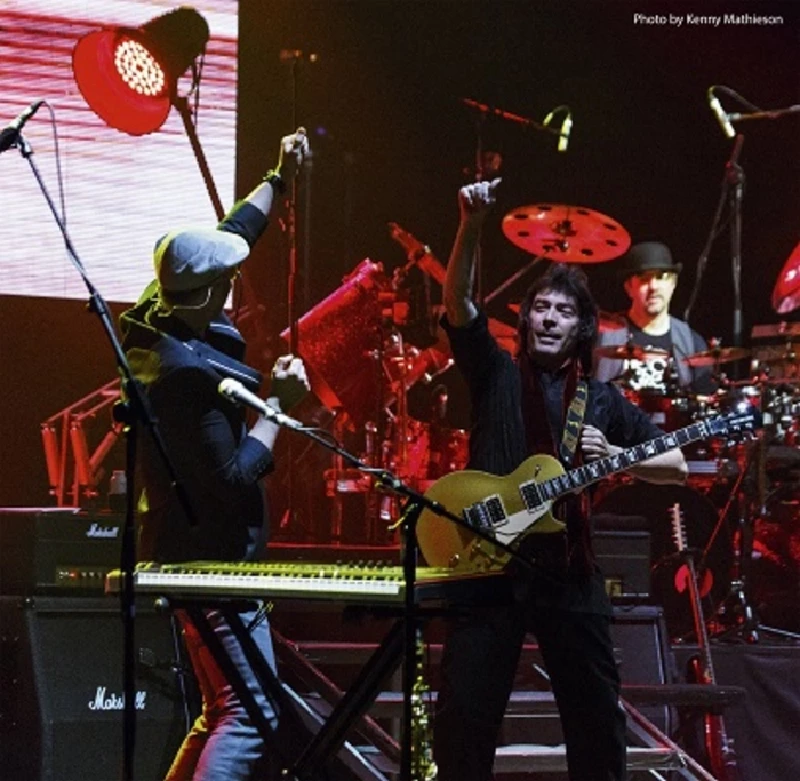
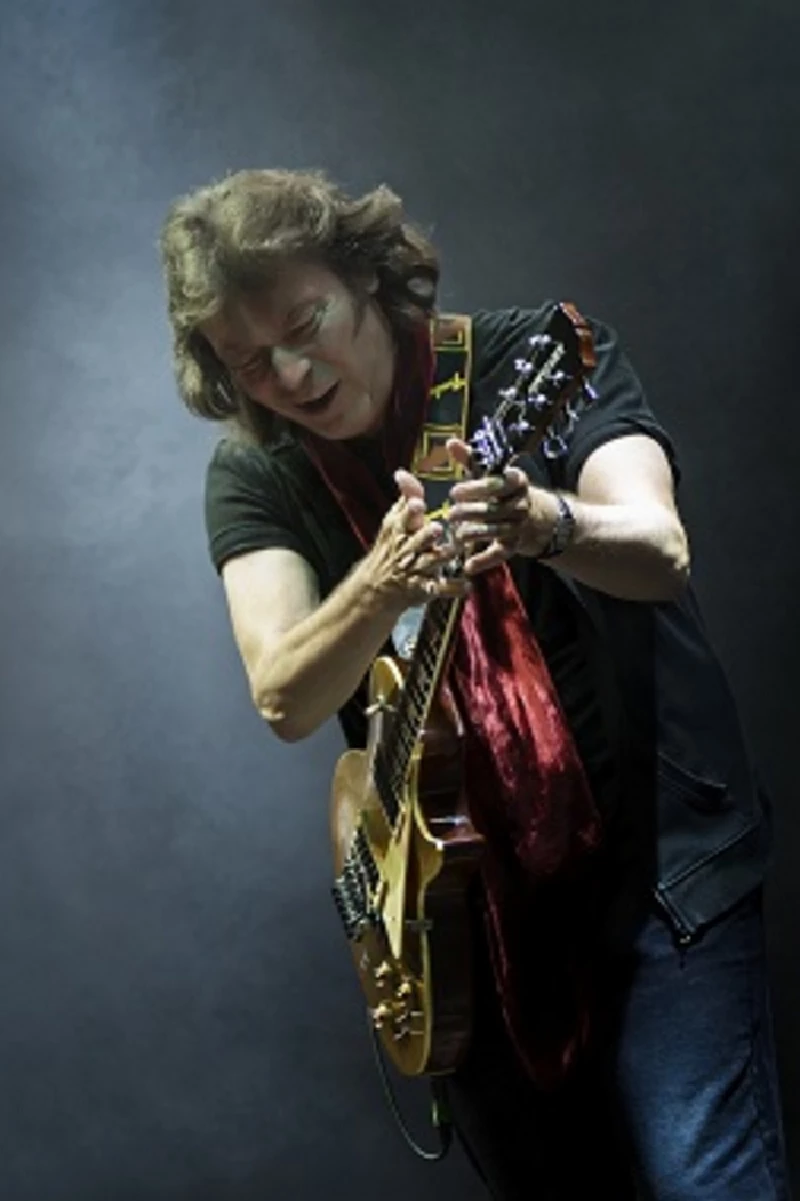
interviews |
|
Interview (2024) |
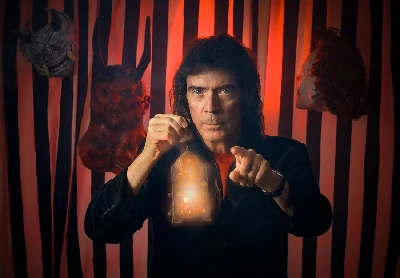
|
| Prog guitar legend Steve Hackett talks to Eoghan Lyng about his new album ‘The Circus and the Nightwhale’ and his years with Genesis, |
| Interview (2021) |
live reviews |
|
Apollo, Manchester, 24/9/2021 |
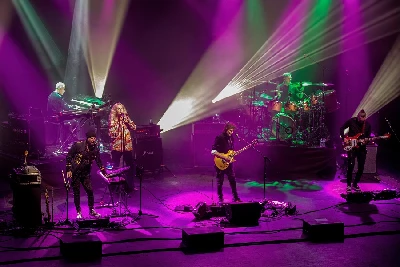
|
| Neil Swift at the Manchester Apollo watches Steve Hackett plays Genesis' entire double live album 'Seconds Out' as well as highlights from his own back and current catalogue. |
photography |
|
Photoscapes (2022) |
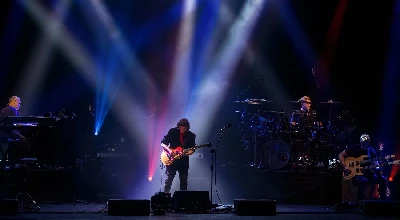
|
| Andrew Twambley takes photographs of ex-Genesis guitarist Steve Hackett with his band at the Manchester Apollo. |
reviews |
|
At the Edge of Light (2019) |
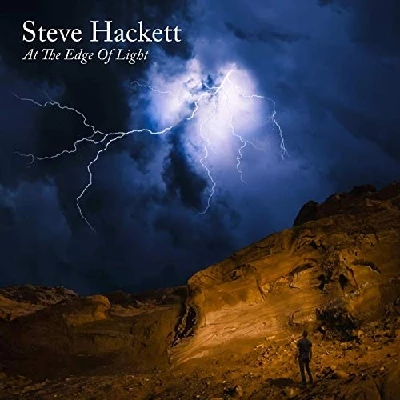
|
| Lavish and ambitious prog rock on latest album from former Genesis guitarist and solo artist Steve Hackett |
most viewed articles
current edition
John McKay - InterviewRobert Forster - Interview
Cathode Ray - Interview
Spear Of Destiny - Interview
Fiona Hutchings - Interview
When Rivers Meet - Waterfront, Norwich, 29/5/2025
Carl Ewens - David Bowie 1964 to 1982 On Track: Every Album, Every Song
Chris Wade - Interview
Brian Wilson - Ten Songs That Made Me Love...
Shrag - Huw Stephens Session 08.12.10 and Marc Riley Session 21.03.12
previous editions
Heavenly - P.U.N.K. Girl EPBoomtown Rats - Ten Songs That Made Me Love....
Allan Clarke - Interview
Oasis - Oasis, Earl's Court, London, 1995
Manic Street Preachers - (Gig of a Lifetime) Millennium Stadium, Cardiff, December 1999
Barrie Barlow - Interview
Pixies - Ten Songs That Made Me Love...
Beautiful South - Ten Songs That Made Me Love...
Trudie Myerscough-Harris - Interview
Dwina Gibb - Interview
most viewed reviews
current edition
Peter Doolan - I Am a Tree Rooted to the Spot and a Snake Moves Around Me,in a CircleGarbage - Let All That We Imagine Be The Light
Vinny Peculiar - Things Too Long Left Unsaid
Vultures - Liz Kershaw Session 16.06.88
John McKay - Sixes and #Sevens
Little Simz - Lotus
HAIM - I Quit
Morcheeba - Escape The Chaos
Pulp - More
Lapsley - I'm a Hurricane, I'm a Woman In Love
related articles |
|
Fairport Convention: Live Review (2014 |
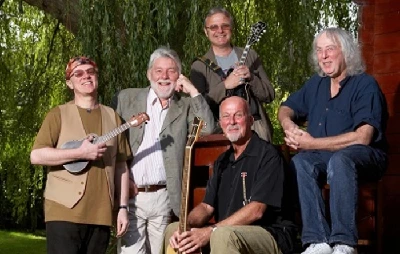
|
| Nick Dent-Robinson enjoys this year's Fairport's Cropredy Convention, which as well as Fairport Convention also saw sets from Chas 'n' Dave, Marillion, Steve Hackett's Genesis Extended and remarkable Welsh singer-songwriter Deborah Rose |
Pennyblackmusic Regular Contributors
Adrian Janes
Amanda J. Window
Andrew Twambley
Anthony Dhanendran
Benjamin Howarth
Cila Warncke
Daniel Cressey
Darren Aston
Dastardly
Dave Goodwin
Denzil Watson
Dominic B. Simpson
Eoghan Lyng
Fiona Hutchings
Harry Sherriff
Helen Tipping
Jamie Rowland
John Clarkson
Julie Cruickshank
Kimberly Bright
Lisa Torem
Maarten Schiethart